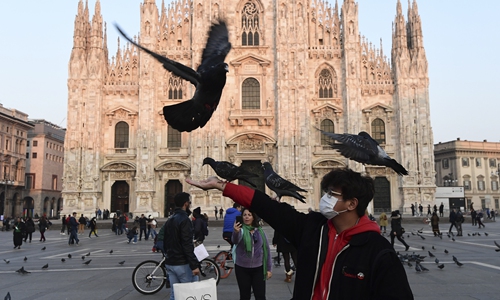Cautious optimism as Europe reopens
By Zhao Yusha and Leng Shumei Source:Global Times Published: 2020/4/21 0:13:40 Last Updated: 2020/4/21 4:50:19

A tourist gives food to pigeons in Piazza del Duomo, Milan. Photo: AFP
European residents and medical personnel stay cautiously optimistic toward the governments' fast resumption plan, which some deemed as a forced move under the pressure of stagnant economy while some countries in the continent have not yet reached the epidemic peak.
Some reached by the Global Times suggested that employers borrow China's experience in pro-moting a safe and orderly resumption.
Spain, where more than 200,000 cases reported as of Monday, announced it will allow minors to leave home starting April 27, but will be limited and subject to conditions to avoid infections.
Italy, the place which reported the second-most cases in Europe following Spain - nearly 180,000 - has already allowed shops selling books, stationery, and clothes for babies and young children to reopen with strict rules on customer numbers and hygiene since April 14, about five weeks after being under lockdown.
Niccolo Mancini, who works for a consultancy firm in Bologna, Italy, told the Global Times that his firm is going to borrow Beijing's model of limiting the number of employees going to the office.
"We allow a certain amount of our staff to work in the office, and keep a safe distance from each other. We are considering allowing not more than five people entering the elevator at a time, just to be safe."
Mancini said he believes it is not the time to let the guard down, but the lockdown must be loos-ened as Italy's sluggish economy cannot bear further economic downturn.
Chinese analysts noted Chinese businesses did not resume full production until late February when the news of cases declining to less than three percent of the peak while Wuhan was locked down until April 8.
Besides pressure from a sluggish economy, they said that the comparatively faster resumption pace in these European countries than China was also partly due to politicians' fear of losing sup-port amid the sluggish economy.
Reports said the number of new cases started to plateau in Italy in the first week of April but thousands of new infections continue to be reported every day.
Germany is also among the first nations in Europe to take cautious steps toward normalcy as German Chancellor Angela Merkel announced on April 15 that schools across the country would resume on May 4, initially for students in their final years of primary or secondary school.
Bj?rn Nahan, Professor of Surgery and Director of the Clinic of Hepato-pancreatico-biliary Surgery and Transplantation in Germany, told the Global Times Monday that resumption in Germany should proceed in a gradual manner.
In Germany, most businesses are still closed as are schools and universities as the country is still in partial lockdown until May 4, Nahan said.
"That [resumption] is the plan if things improve," Nahan said, noting that discussions over the plan revolve around a careful and stepwise reopening" and each country and province are taking different steps to resume a normal start based on the local situation.
Nahan's words reflected an apparent gap between different European countries in the epidemic situation.
For example, on opposition to relaxation in countries mentioned above, UK Foreign Secretary Dominic Raab told media Thursday that lockdown restrictions would be extended for at least an-other three weeks as a review had concluded relaxing measures now would risk harming public health and the economy.